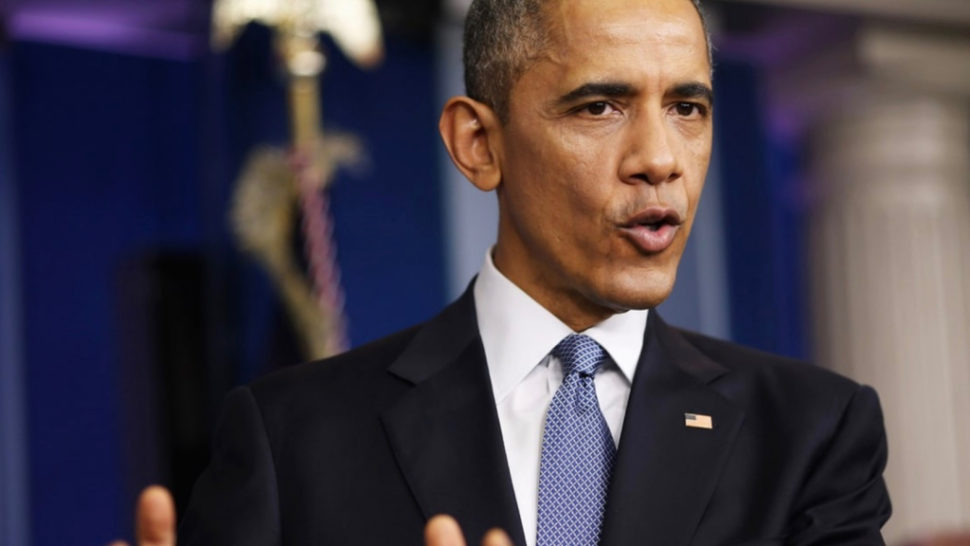Obama Enacts Offshore Drilling Ban Designed to Be Trump-Proof

 In a historic move taken a month to the day before he hands over the White House to one of the most fossil-fueled administrations in U.S. history, President Obama answered the call of Native Alaskans, coastal residents and climate activists demanding offshore drilling bans, and stuck it to Donald Trump.
In a historic move taken a month to the day before he hands over the White House to one of the most fossil-fueled administrations in U.S. history, President Obama answered the call of Native Alaskans, coastal residents and climate activists demanding offshore drilling bans, and stuck it to Donald Trump.
Obama banned all future offshore oil and gas drilling from nearly 120 million acres of land in the Atlantic and Arctic oceans. The bans include a series of underwater canyons along the Atlantic stretching from Massachusetts to Virginia, and virtually all of the U.S. Arctic, including the entire U.S. Chukchi Sea and all but about two percent of the U.S. Beaufort Sea.
In a joint announcement with the White House, Canadian Prime Minister Justin Trudeau simultaneously designated all Arctic Canadian waters off-limits to drilling. The bans come as concerns rise that due to Trump’s nomination of Exxon Mobil CEO Rex Tillerson as secretary of state, the company will soon begin exploring for oil in the Russian Arctic.
“Holy muskrat, it’s good news!” says 69-year-old Native Inupiat Doreen Simmonds, a local leader against drilling in her home community of Barrow, Alaska, on the edge of the Chukchi Sea. “They talk about ‘responsible drilling’ – that’s a lot of anaq [shit]. They always make mistakes. If there was a spill up here in our ice? It would be the end of our water, our land. … What would be left for my great-grand-kids?”
It was Shell’s operations in the Chukchi Sea that set off protests in Seattle and elsewhere last year, pitting “kayaktavists” against Obama.
Though the Canadian ban will be reviewed every five years, President Obama’s bans are indefinite and designed to be permanent, akin to the designation of a national monument.
This is likely to make the bans Trump-proof. Unlike an executive order, which can be undone easily by another president, “never in history has a president undone a permanent oil and gas withdrawal of another president,” says Niel Lawrence, Alaska director and senior attorney at the Natural Resources Defense Council.
The incoming Congress and administration will surely try, as Alaska’s Republican senator, Lisa Murkowski, told Alaska Dispatch News Tuesday. But the fight will be a long one. “I am confident that [the ban] will stand up in court,” Lawrence says.
Presidential bans on offshore oil drilling have a long history and are granted through the 1953 Outer Continental Shelf Lands Act, which states, “The President of the United States may, from time to time, withdraw from disposition any of the unleased lands of the outer Continental Shelf.”
As Bloomberg reports, “While presidents have modified decisions from their predecessors to withdraw areas from drilling, they have never rescinded them altogether. And it’s not clear they would have the power to. A legal opinion from the U.S. attorney general in 1938 said similar designations ‘do not imply a power to undo.’ And there have been no federal court rulings on the provision.”
Permanent bans to relatively small offshore areas have been enacted by Presidents Eisenhower, Nixon, George H.W. Bush, Clinton and Obama; all of them remain fully intact. In 1990, President Bush enacted a moratorium on all new offshore drilling in the federal waters of the Pacific, Atlantic and most of Alaska. But that was a temporary act, set to expire after ten years. President Clinton extended the moratorium through 2012, only to have the second President Bush cut off its last four years, allowing it to expire in 2008. No president has permanently protected so vast an area of offshore waters from oil and gas drilling as President Obama has now done.
This is a position likely to be popular among Americans, 75 percent of whom, responding to a March Gallup poll, said they preferred alternative energy to the production of oil and gas; that included 51 percent of Republicans. The same month, more than 45 climate, conservation, indigenous and coastal organizations filed a legal petition calling on Obama to end new oil and gas lease auctions in all federally controlled oceans.
“Permanently shielding these waters from the oil and gas industry is a major milestone for coastal communities that depend on them – as well as a global community acting collectively to mitigate the worst of climate change,” Mary Sweeters, an Arctic campaigner with Greenpeace, said in a statement. “But the job will not be done until no new leases are granted anywhere in U.S. waters.”
